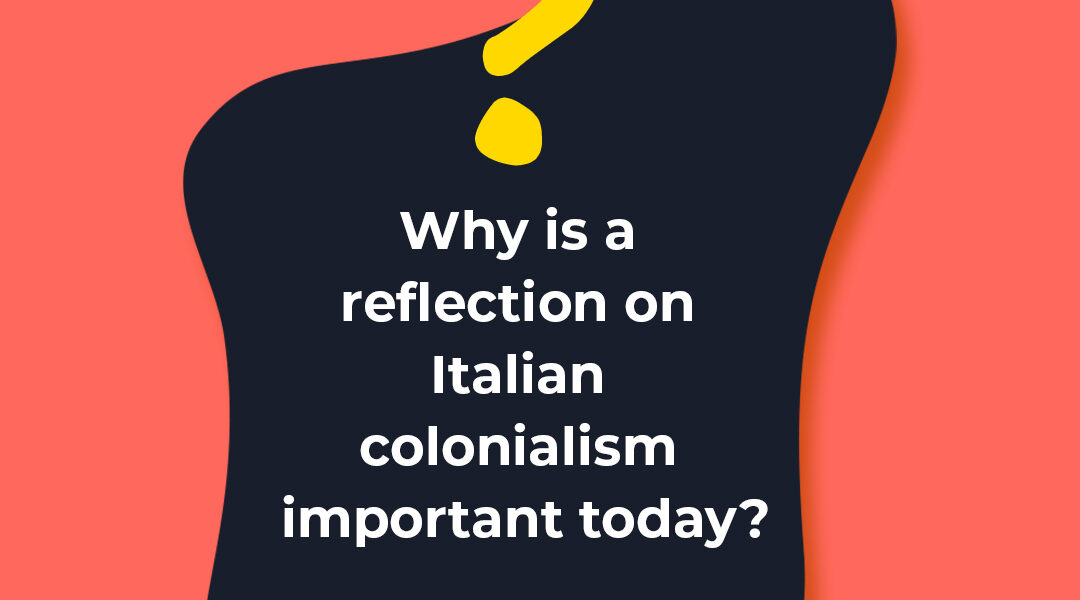
Why is a reflection on Italian colonialism important today?
History can take on an entirely different meaning depending on which sources are used to tell it, but as the postcolonial historian Michel-Rolph Trouillot states: “the past does not exist independently from the present… the past is a position (in time) and in no way can we identify the past (only) as past”*. Elsabiet’s story makes us reflect on a chapter of the Italian history that is still not part of a historical and collective memory: the Italian colonialism. Italy was a colonial power for about a century, from 1868 – the year of the Assab Convention – to 1960, the year in which 17 African states regained their independence. These included Somalia, over which Italy still had a mandate and where more than ten thousand Italians still lived at the time.
From the early decades of its occupation, Italy was responsible for war crimes and massacres, implementing strategies aimed at the extermination and subjugation of populations in Eritrea, Ethiopia, Libya, and Somalia. To recall just a few of the worst moments, there are the massacres of Dogali and Adua, in 1887 and 1896 respectively, the extermination operations against the Oromo and Amhara populations, the genocide of the Arab population in Libya between 1929 and 1934 through killings, organised famine operations and the establishment of concentration camps. The latter was also followed by a campaign of erasure of historical documents. And the Addis Ababa massacre of 1937, known for its unprecedented violence. Over the years, thousands of Italians moved to the colonies, leading to a demographic and urban colonisation of cities such as Asmara, Mogadishu and Addis Abeba in which names of streets and squares remembered the fascist propaganda. Similarly, in many Italian cities there are still streets, squares, plaques and monuments commemorating it. Thus, the crimes and atrocities of colonialism are removed from the public and collective consciousness and become mere unknown and distant names. Moreover, there is a lack of awareness of the presence of African people in Italy since time immemorial, and of Eritrean people since colonialism.
The military occupation was accompanied by the imposition of Italian language and culture, and was justified to public opinion through notions of racial superiority—ideas that once legitimized such actions and that today, have not been sufficiently confronted or critically examined. With the racial laws of the 1930s, ethnic segregation increased and from 1937, in contrast to what had happened until then, relations between locals and Italians were forbidden and sanctioned, fathers were forbidden to recognise children and give their Italian surnames. Even after the repeal of the fascist laws, thousands of people were not granted Italian citizenship. According to some historians, the Italian colonial past was quickly forgotten because it became associated with a sense of shame, stemming from the military defeat that marked its end. Furthermore, Italians were never tried for the crimes committed in the former colonies even though in 1946, during the Paris Conference, Ethiopia asked for the recognition of the crimes committed by Italy.
Today, the Italians colonialism and its consequences have been collectively removed and not included in schoolbooks. The absence of responsibility attributed to Italian actions impedes critical reflection on the deep wounds left and on the political, cultural and social system of countries that today are also territories of high emigration flows to Europe. In parallel, the lack of condemnation, and subsequent reflection, on colonialism still determines the presence of collective racist schemes that manifest themselves in concepts, narratives and categorisations of populations on the one hand, and in political choices on the other.
Only through a deconstruction of the past, past and present responsibilities can emerge and enrich the debate on the Italian identity, which cannot be disconnected from its colonial and racist past. “Yekatit 12 -19 February”, an Italian network that organises numerous initiatives against the removal from collective memory of colonialism and its crimes, proposes to establish a Day of Remembrance of the victims of Italian colonialism on 19 February, which is still today national mourning day in Ethiopia in remembrance of the victims of italian colonialism.
*“…But the past does not exist independently from the present. Indeed, the past is only past because there is a present, just as I can point to something over there only because I am here. But nothing is inherently over there or here. In that sense, the past has no content. The past — or more accurately, pastness — is a position. Thus, in no way can we identify the past as past.” (Trouillot, M-R., (1995). Silencing the Past: Power and the Production of History, p. 15).
To learn more, we recommend reading a number of articles that deal with the subject in a critical and detailed manner:
- The articles part of Ritratt3 (unfortunately in italian) – newsletter edited by Soda Morem Lo, part of the Scienza Migrante 2.0 team, and Gloria Napolitano – which aims to tell the forgotten stories of Afrodiscendents profiles of Italy: https://substack.com/@ritratt3?r=2nkkml&utm_medium=ios&utm_source=profile
- The Crimes and Victims of Italian Colonialism: A Story That Must Be Told, Beginning with Yekatit 12 የካቲት ፲፪
- Breaking the silence: Postcolonial Italy | The Florentine The Florentine
- Review of Genocide in Libya: Shar, a Hidden Colonial History – The Footnote
- Postcolonial Italy – Mapping Colonial Heritage
- Black Central Europe – We bring you over 1000 years of Black history in the German-speaking lands and show you why it matters right now


